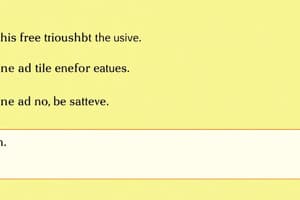Podcast
Questions and Answers
In the sentence 'The cat sat on the mat', what is the subject?
In the sentence 'The cat sat on the mat', what is the subject?
- mat
- cat (correct)
- on
- sat
Which sentence follows the Subject-Verb-Indirect Object-Direct Object (SVOIO) pattern?
Which sentence follows the Subject-Verb-Indirect Object-Direct Object (SVOIO) pattern?
- The flowers are beautiful.
- The dog chased the cat.
- The children played happily in the park.
- My mom gave me a book. (correct)
What is the complement in the sentence 'The cat is a tiger'?
What is the complement in the sentence 'The cat is a tiger'?
- tiger (correct)
- cat
- a
- is
Which sentence is an example of the Subject-Verb (SV) pattern?
Which sentence is an example of the Subject-Verb (SV) pattern?
Which of the following is NOT a common sentence pattern in English?
Which of the following is NOT a common sentence pattern in English?
Flashcards
Subject-Verb-Object (SVO)
Subject-Verb-Object (SVO)
The most common English sentence structure with an order of Subject, Verb, Object.
Subject-Verb (SV)
Subject-Verb (SV)
Sentence structure with only a subject and verb, often showing a state or action.
Subject-Verb-Complement (SVC)
Subject-Verb-Complement (SVC)
Structure with a subject, verb, and a complement that describes or renames the subject.
Subject-Verb-Indirect Object-Direct Object (SVOIO)
Subject-Verb-Indirect Object-Direct Object (SVOIO)
Signup and view all the flashcards
Subject-Verb-Adverbial (SVA)
Subject-Verb-Adverbial (SVA)
Signup and view all the flashcards
Study Notes
Subject-Verb-Object (SVO)
- This is the most common sentence pattern in English.
- It follows the order: Subject – Verb – Object.
- Example: "The dog chased the cat." (Subject: dog; Verb: chased; Object: cat)
- The subject performs the action of the verb on the object.
Subject-Verb (SV)
- This pattern uses only the subject and the verb.
- Often used to express a state of being or a simple action.
- Example: "The sun shines." (Subject: sun; Verb: shines)
Subject-Verb-Complement (SVC)
- This pattern has a subject, a verb, and a complement that describes or renames the subject.
- The complement can be an adjective or a noun.
- Example: "The flowers are beautiful." (Subject: flowers; Verb: are; Complement: beautiful)
- Example: "The cat is a tiger." (Subject: cat; Verb: is; Complement: tiger)
Subject-Verb-Indirect Object-Direct Object (SVOIO)
- This pattern involves a subject, a verb, an indirect object, and a direct object.
- The indirect object receives the direct object.
- Example: "My mom gave me a book." (Subject: Mom; Verb: gave; Indirect Object: me; Direct Object: book)
Subject-Verb-Adverbial (SVA)
- This pattern has a subject, a verb, and an adverbial phrase that describes how, when, or where the action takes place.
- Example: "The children played happily in the park." (Subject: children; Verb: played; Adverbial: happily in the park)
Other Patterns
- While less common, there are other less frequent patterns as well.
- These may involve prepositions, phrases.
- Analysis of the meaning is crucial to determine whether a sentence is accurately represented by a particular pattern.
- Understanding the meaning and intent can lead to the identification of the precise pattern for complex sentences.
Studying That Suits You
Use AI to generate personalized quizzes and flashcards to suit your learning preferences.




